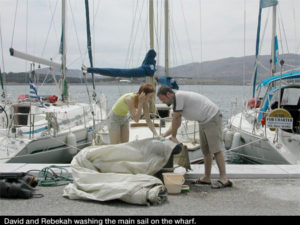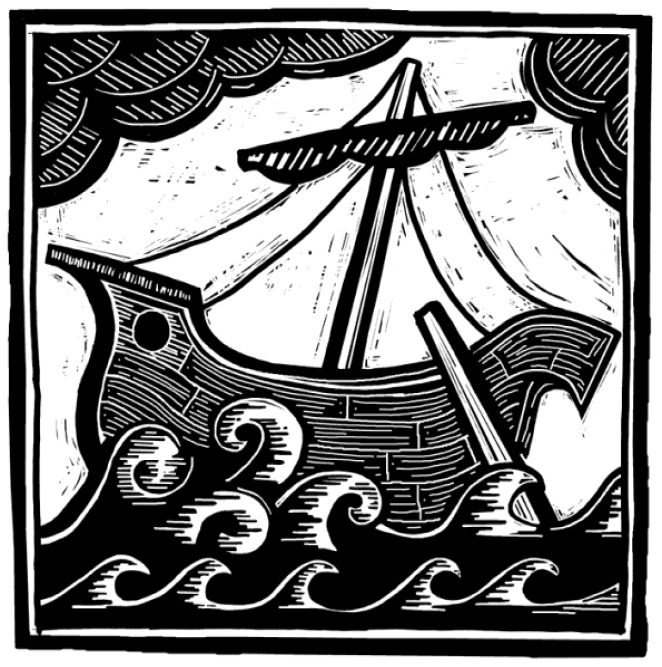 Volos is beautiful. Janet and I have come to realize that, if you need to fix up a boat, wait on Greek and American paperwork, and prepare for a Mediterranean voyage, this is probably the best place you could possibly be. Volos is due north of Athens about 300 kilometers. A small city of 112,000, in a harbor famous for being the one from which Jason and the Argonauts launched their search for the Golden Fleece, it offers everything within walking distance from the wharf – marine supply stores that has, or can order any marine product ever made, and will call out for a cup of coffee while say, a husband is waiting for his wife to show up with money to pay for the purchase. There are banks, restaurants, newsstands, and literally hundreds of little shops each selling a couple of products like batteries, locks, paint, thread, etc.
Volos is beautiful. Janet and I have come to realize that, if you need to fix up a boat, wait on Greek and American paperwork, and prepare for a Mediterranean voyage, this is probably the best place you could possibly be. Volos is due north of Athens about 300 kilometers. A small city of 112,000, in a harbor famous for being the one from which Jason and the Argonauts launched their search for the Golden Fleece, it offers everything within walking distance from the wharf – marine supply stores that has, or can order any marine product ever made, and will call out for a cup of coffee while say, a husband is waiting for his wife to show up with money to pay for the purchase. There are banks, restaurants, newsstands, and literally hundreds of little shops each selling a couple of products like batteries, locks, paint, thread, etc.
Last Saturday evening Captain Steve, the former owner of the Aldebaran, and his Belgian wife, Jenny, invited Janet, David and me out for dinner. We drove out of Volos, up a winding rode high in the mountains that surround the harbor, to a little village of Makrinitsa, where we sat on a terrace feasting on excellent food, seeing the sights, and enjoying Captain Steve’s tales of sailing freighters all over the world. “Why are there so many Greek merchant ships, so many Greek sea captains?” I ask.
 “We Greeks are adventurers, explorers,” Captain Steve explains. “We like to explore the world, and the world of new ideas as well. We are not afraid of new things.”
“We Greeks are adventurers, explorers,” Captain Steve explains. “We like to explore the world, and the world of new ideas as well. We are not afraid of new things.”
How like Paul, I think. I wonder if Paul didn’t meet people like Captain Steve whose stories of travel in far off places fueled his curiosity further. There are two words that seem to describe Paul in the book of Acts: exploration and experimentation. Maybe Paul’s efforts of getting Greeks included into the Kingdom had something to do with these traits he admired so much, because he had them himself.
The conversation eventually turns to religion. Captain Steve is not a theologian; he sees himself as a realist. “I see religion as the greatest invention of humanity,” he expounds, “absolutely necessary for society to hold together.” He has all of the works of Plato which he reads almost every night before going to sleep.
“We want a book from you when you finish,” Jenny says after they have asked us about the project.
“You will want to read it,” I say, “because you will be in it.” There is a chuckle all around.
Captain Steve has been extremely helpful, often stopping by in the morning to see how the work is progressing, figuring out cheap solutions to expensive problems, and giving advice.
 Rebekah, David’s special friend from Germany, arrived Monday. Four people on board. She adapted immediately, and with enthusiasm, to the demands of getting to know Janet and I within the confines of a boat. It was a real pleasure to have her here, talking German, discussing Acts, enjoying her help and energy.
Rebekah, David’s special friend from Germany, arrived Monday. Four people on board. She adapted immediately, and with enthusiasm, to the demands of getting to know Janet and I within the confines of a boat. It was a real pleasure to have her here, talking German, discussing Acts, enjoying her help and energy.
Yesterday morning Rebekah and David left to catch their flight from Athens to Germany. While it is not particularly easy to have guests on board, with the cramped quarters, the tiny head, the miniature galley, it is harder to say goodbye to loved ones who have been guests. It is not like saying goodbye at home, where one is surrounded by friends, colleagues, neighbors, family, and loved ones. Janet and I felt very alone, the boat very empty.
Paul had to say goodbye so often during his journeys when he left little groups of Jesus’ followers in the pagan cities of the Empire. One of these departures is described in Acts 20:37 – 38 “They all wept as they embraced him and kissed him. What grieved them most was his statement that they would never see his face again. Then they accompanied him to the ship.” I understand the pain of dockside departures just a little better after this morning.
Two days ago the last of the Greek documents arrived. I sent them by special delivery to our agent in the United States. From now on we will be waiting on the US Coast Guard for the documents that will allow us to sail.
We will continue to work as we wait. I do not know how long we will be here. Paul did not know this either. How much of his journeys were without clear knowledge of when he could move on, or how long he was going to stay? Paul did not have a fixed schedule because, at least when he traveled by sea, he was not in control. To follow his journeys on a boat bought in Greece, for sailing the Mediterranean, we are experiencing, and will continue to experience, the same conditions.
This is different from all other cross-cultural travel Janet and I have done. There is no network and infrastructure for the foreigner, fixing up his Greek boat. One must rely totally on the personal relationships of boat neighbors and others, all Greek. One is aware of being American. One is afraid of becoming tiresome. One is not sure who will give you good advice and who will try to profit from your ignorance. We can only negotiate, develop trust, and rely on people who are not paid to help us. This is good, being a resident alien. This is like Paul. We have not left the wharf and already we are sailing Acts.
